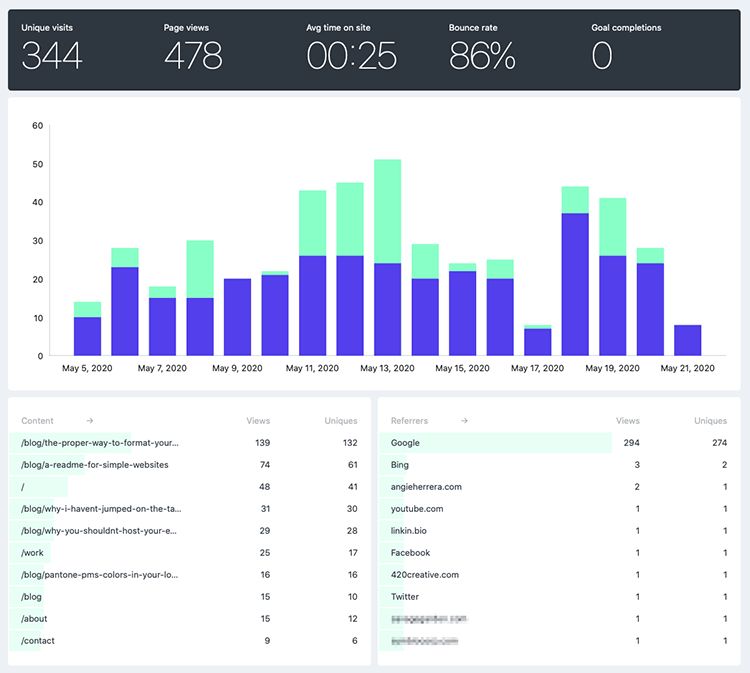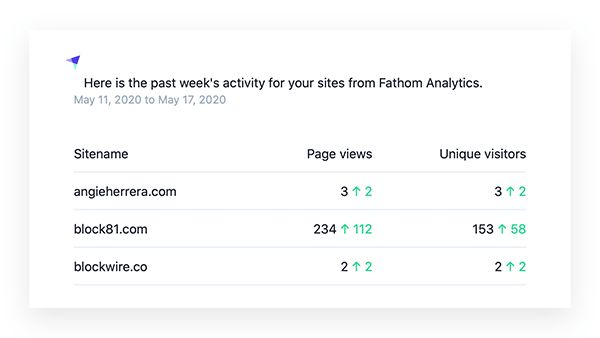I Switched to Fathom Analytics
Why I ditched Google and switched to Fathom Analytics for tracking on my websites.
Google Analytics. To use it or not? That's the question I've been pondering for almost a year. Although I concluded that having Google Analytics installed was a good thing overall, something has been nagging at me for quite some time in regard to not just GA, but to Google overall. It's this:
If you aren’t paying for a product, you are the product.
I believe it was Paul Jarvis that wrote that... somewhere. (I really need to start writing this stuff down.) But here's the kicker: when it comes to Google, sometimes even if you are paying for a product, you're still the product (hi Gmail).
To be clear, I do use Google products. Google Analytics is present on around 70% of all websites (per this source). But with the exception of YouTube, I try to keep my usage of Google products to a minimum. Google just makes me feel icky most of the time. And Google Analytics is extra icky. As Dave Rupert put it:
With a click of a button I can install “Enhanced Analytics” and start getting demographic information on my visitors: ages, genders, and whether or not they’re in the market to buy a car or house. I can’t see individual user data, but it hints at the kind of data Google pieces together about you as you browse the Internet.
Alright, so I don't want to go down the rabbit hole of privacy and Google. My point of all this, is that I've had this debate going on in the back of my head for quite some time about whether I even need to use Google Analytics. The question is actually more about whether I even need analytics at all. And the answer is that I do. I like and want to be able to see what pages on my site are visited most, and maybe a couple of other metrics.
So with that internal debate going on in my head, earlier this month I decided to give a Google Analytics competitor a try.
Enter Fathom Analytics
In 2019 I read "Company of One" by Paul Jarvis. It's a great book – one I'd like to read again. As a result of reading his book, I also subscribed to his email newsletter and his Creative Class podcast. He's a big proponent of online privacy, and at some point along the way I learned of Fathom Analytics, of which Paul is a co-founder.
Fathom Analytics is an incredibly simple (literally one page) and powerful analytics platform. It tracks four things by default: unique visitors, page views, time on site, and bounce rate. It then shows you these things plus a bit more in a few super simple charts.

That's literally it. And honestly, that's pretty much all I need for my website. Anything more than that and it just feels like overkill. I'm also willing to bet most small business websites don't need much more than what Fathom tracks either.
Okay, great, so now we know what Fathom is. But what really made me give it a serious look?
Simplicity
At first, probably because I'm used to the clicking and rabbit hole diving of Google Analytics, I thought, "that's it?" But I firmly believe that's Fathom's strength. If I'm basically looking at the same stats as I would in GA (namely popular content, referrers, bounce rate, and goals) what's the point of having more data? Especially if I do absolutely zero with that extra data.
UI
I'm a designer. Good UI design is important to me. And I think it's important to most people, sometimes without even really knowing it. Part of Fathom's good UI lies in its simplicity, but it's also small details and ease of use. Is Google Analytics' UI terrible? Nope. But it can get overwhelming. Part of that is the sheer amount of data, sure. But it's also how that data is designed.
Data Policy
This is probably the most important bit: Fathom's data policy (which you can read in full here). It focuses entirely on protecting people’s privacy while "still enabling website owners to understand how their website is performing." This means they really anonymize visitor data, the software does not use cookies to store anything, and its fully GDPR and E-Privacy compliant. This is all important to me because again, what I mainly care about is how many visitors I get, what my visitors are seeing, and what the trends are over time. Do I really need to know their their gender, household income, or whether they're in the market to purchase a new house? Nah. TMI Karen, TMI.
Features I Dig
So those are the things that drew me in. I started my 7-day free trial in early May and made it a point to check my stats every day for that week mainly to see how Fathom presents and updates the data I'm most interested in. I was sold after a few days. Here's what I've come to really like about Fathom.
Easy setup
Okay, so setting up Google Analytics isn't difficult by any stretch of the imagination. But if Fathom had been more complicated that GA, it probably would've bothered me. Luckily Fathom was super easy to set up. Like, it was so easy it's kinda laughable, and I mean that in the nicest way possible. 😆
Multiple sites
I have two additional sites besides this one that I like to have stats on. Fathom, because of its easy setup, made it easy to add them. And switching between the three of them to view stats is literally a click or two away. What makes this a feature I like though isn't just that it exists, it's that it doesn't cost extra to track multiple sites. That would've easily been a deal breaker for me.
Viewing data from virtually any time period
Wanna see stats from yesterday only? Or maybe just this past week? Or how about the past 30 days? Or maybe you need to check stats from 2 months ago? Fathom can do all that. This is important for all kinds of reasons, but if you're running some sort of campaign (and I use that term loosely) it becomes just a bit more important to have that data at your fingertips.
Simplicity in stats
I absolutely love how simply and clearly the stats in Fathom are presented:
- There's no "drilling down" endlessly for any particular stat. And I hope that never changes.
- You can easily see numbers and percentages just by clicking on the number. Click on the raw number, it changes all numbers to a percentage. Click on the percentage, it changes everything back to a number.
Weekly email reports
As much as I would like to log in every morning to check my stats, obviously I have other things to do. Fortunately, Fathom gives you the option to have reports emailed to you either every week or every month (or both if you need that for some reason). And if you need the reports emailed to someone else, you can do that too.
The report email is, as you can guess, simple and straightforward. Seriously though, what more do you need?

Better tracking?
So Google Analytics, likely because it is the behemoth that it is and thus it's everywhere, gets blocked by almost every ad blocker. But as Chris Blackwell points out in his Medium article, Fathom doesn't get blocked by most ad blockers and as a result, it likely tracks better than Google Analytics. The reasons Fathom doesn't get blocked? As Chris Blackwell notes:
- Fathom is smaller than most analytic companies and will fly under the radar a bit more.
- Fathom doesn’t use cookies.
- Fathom is a privacy-focused company.
I would also add that, if you've chosen to do so, having Fathom on a custom domain also helps prevent ad blocking. I mean, they say so right in their custom domain support document.
Sticking with Fathom
After reading that list you might be thinking, well all or most of that is totally doable in Google Analytics. And you'd be correct. The point isn't features that GA doesn't have and Fathom does. The point is that Fathom needs to have a few of the same features (and potentially presented better) – in addition to its data and privacy policy – in order to even be considered as an alternative, especially if it's one you have to pay for. And Fathom hits that goal with ease, and then some.
Admittedly I've only been using Fathom for a couple weeks, but I'm already impressed by it. Because of its small footprint, my site loads faster and is probably getting better stats. And honestly, Fathom Analytics' privacy focus is just something I can't ignore.